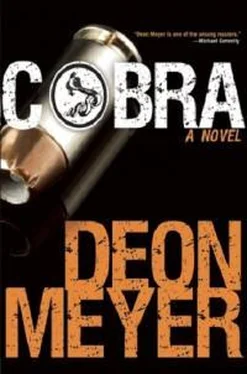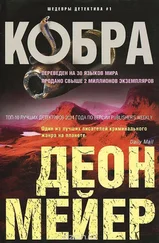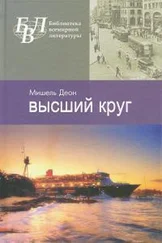‘Vaguely.’
‘Very well. Please allow me to elaborate: SWIFT is based in Belgium. It is a network that enables financial institutions across the globe to send and receive information about monetary transactions. Your bank, for instance, would have a SWIFT code, which is part of this system. Should you receive money from abroad, this code is used, and the information about the transaction is registered on SWIFT’s computers. Simple stuff, is it not?’
They nodded in unison.
‘Now, shortly after 9/11, the CIA and the US State Department set up the top secret and pretty controversial Terrorist Finance Tracking Programme, also known as TFTP. In a nutshell, this programme provides US authorities with access to the SWIFT database, in order to trace financial transactions that might identify potential terrorist activities. You might have heard of it . . .’
‘Yes,’ said Nyathi.
‘In June of 2006, the New York Times ran the first media exposé on TFTP, but the project survived, due to the public sentiment at the time, perhaps, but also because TFTP proved extremely useful right off the bat. However, being a US-only initiative, it was lacking in reach and scope. To be truly effective, it needed to go global. So, the USA invited the European Union to come on board. Of course, Europe was equally concerned about the terrorist threat, and keen to cooperate. But initially the European Parliament rejected an interim EU–US TFTP agreement, because they felt it did not offer EU citizens enough privacy protection. Are we still on the same page?’
‘Yes,’ said Nyathi.
‘Good. This is where David Adair enters our story. He was invited to become a member of the EU evaluation team of the TFTP agreement, because of his expertise in database search algorithms. Adair took a long, hard look at the US system, and came to the conclusion that it could be vastly improved – not only in terms of privacy safeguards, but also in effectiveness. He then proceeded, as geniuses do, to write a vastly superior algorithm on a whim, and offer it to the authorities. Of course, they gratefully accepted, and in 2010 the EU announced their resumption of the TFTP. The so-called Adair Algorithm then became the standard methodology to sniff out terrorists in the international banking system. It has been responsible for the identification and subsequent termination of at least seven terrorist cells, and an impressively large number of senior al-Qaeda leaders and operatives.’
Emma Graber leaned back in her chair, spreading her hands, palms open, as if she had nothing more to hide.
‘Gentlemen, the Adair Algorithm is one of the best-kept and most vital international security secrets in history. If it falls into the wrong hands . . .’
She let the thought hang in the air for a minute, then she said, ‘Now please tell me about the nature of the kidnapping.’
Griessel listened to Nyathi skipping over certain details of the investigation.
With carefully chosen words and in perfect English, the Giraffe told Emma Graber about Adair’s initial contact with Body Armour, his arrival and stay on La Petite Margaux, the death of the farm worker and two bodyguards, and the signs of struggle in the master bedroom. He described the security measures, and how they thought the crime had happened.
Graber asked Nyathi for the email address of the Paul Anthony Morris alias.
He said he would have to consult their notes, but he would send it on. Griessel remembered the address well, but kept quiet.
Nyathi said not a word about the cartridges with the snake and the letters NM engraved on them. Nor of the missing laptop, iPad, and possible cellphone – the Hawks’ only clues.
Griessel suspected it was deliberate, but he wasn’t sure.
When the colonel had finished, they negotiated a joint press release to quell the hunger of the media, and relieve the pressure on the families of the bodyguard victims and the wine-farm personnel.
It would state that an unidentified man, presumably a European tourist, was missing after a guesthouse employee and two security officials were shot dead during a break-in. Missing and possible incorrect passport details had made the identification of the missing person difficult at this stage, but he was thought to be male and a British citizen. The Directorate of Priority Crimes Investigation was grateful for the willingness and cooperation of the British Consulate regarding this matter. As soon as a positive identification could be made with certainty, and the sensitivity of the investigation allowed it, the media would be fully informed. In the meantime, no stone would be left unturned to bring the perpetrators to book and to track down the missing person. Various leads were being followed.
Nyathi told Graber they would have to inform one more Hawks’ colleague of the identity of David Adair: Major Benedict Boshigo, member of the Statutory Crimes Group of the Hawks’ Commercial Crimes in the Cape – their expert in financial affairs. But he could give her the assurance that Boshigo, just like them, would handle the information in confidence. ‘Until such time as we agree otherwise.’
‘Very well,’ she said amiably.
They solemnly agreed to inform each other of relevant developments, as often as circumstances allowed.
Graber walked them to the lift, where they said goodbye.
Only once they turned into Buitengracht, in the direction of Bellville, did Nyathi speak.
‘I want you to call the Body Armour boss, Benny, and inform her that the British authorities might contact her. I want you to tell her that divulging any information to anyone other than the SAPS would constitute a crime . . .’
‘Sir, I think we should . . . She’s a tough one, it would be better not to . . .’
‘Threaten her?’
‘Yes.’
‘See what you can do. But above all, ask her not to share Morris’s email address.’
He rang. She answered promptly.
He told her that the Hawks would issue a press release later that night that would relieve the pressure on the families of the two murdered bodyguards. He agreed to send it to her as well.
‘I appreciate that,’ she said.
‘There’s a possibility that someone from the British Consulate might contact you. We ask whether it would be possible to refer all their queries to us.’
She remained silent for so long that Griessel thought the connection had been lost.
‘Hello?’ he said.
‘I’m here.’
He waited.
‘Here’s the deal,’ she said. ‘I won’t tell them a thing. But you tell me everything.’
‘That is not possible at the moment.’
‘You are going to tell me everything when it is possible. I don’t want to read anything in the press that I don’t know, or I’ll phone the Consulate.’
‘All right,’ said Griessel, and rang off.
‘Mission accomplished?’ Nyathi asked.
‘Yes, sir.’
‘Well done. You’re pretty good with people, Benny . . .’
He didn’t know what to say to that.
‘The first thing you have to understand about the intelligence community is that they only tell the truth if it serves a purpose. Their purpose, mostly.’
‘Yes, sir.’
‘Graber is most likely MI6. Also known as the Secret Intelligence Service, or SIS. She is probably working closely with MI5, the British national security service, which hunts terrorists inside the UK, amongst other duties.’
‘Sir . . .’ He couldn’t sit on it any more. ‘You seem to know a lot about all this?’
Nyathi laughed, and Griessel wondered whether it was the first time that he had seen the colonel do that.
‘Twenty-six years ago I was recruited for MK Intelligence, Benny. Because I was a schoolteacher, they thought I was intelligent. And I worked in London for a while . . . What I’m trying to say is that lying is part of that profession. And I think she is lying to us. Or at least not telling the whole truth.’
Читать дальше












